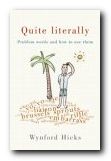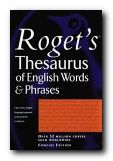free pages from our English Language software program
Punctuation – definition
![]() Punctuation in English language is used in writing to show the stress, ryhthm, and tone of the spoken word.
Punctuation in English language is used in writing to show the stress, ryhthm, and tone of the spoken word.
![]() It is also used to clarify the meaning of sentences.
It is also used to clarify the meaning of sentences.
Examples
![]() There are four common marks of punctuation:
There are four common marks of punctuation:
![]() These represent pauses of increasing length in a sentence.
These represent pauses of increasing length in a sentence.
comma [ , ] semicolon [ ; ]
colon [ : ] full stop [ . ]
Use
![]() The following paragraph uses all the four common marks of punctation.
The following paragraph uses all the four common marks of punctation.
Punctuation should always be used lightly, even sparingly, and as accurately as possible. You will discover through practice that there are three basic rules: the comma, semicolon, and colon mark increasingly long pauses; full stops are used to separate distinct sentences; and a new paragraph should always
be employed to begin a new topic or point of argument.
![]() NB! ‘Punctuation’ in speech is produced by tone, rhythm, stress, and intonation.
NB! ‘Punctuation’ in speech is produced by tone, rhythm, stress, and intonation.
![]() The four most common marks of punctuation are dealt with in detail in their own sections:
The four most common marks of punctuation are dealt with in detail in their own sections:
commas – semicolons – colons – full stops
![]() The other common marks of punctuation are described below:
The other common marks of punctuation are described below:
![]() Some miscellaneous remarks on punctuation.
Some miscellaneous remarks on punctuation.
![]() Brackets (these) are used to insert a remark (like this, for instance) or a qualification of some sort into a sentence.
Brackets (these) are used to insert a remark (like this, for instance) or a qualification of some sort into a sentence.
![]() Take care! If they are used too frequently they create a choppy, unsettling effect.
Take care! If they are used too frequently they create a choppy, unsettling effect.
![]() Full details in the section on brackets.
Full details in the section on brackets.
![]() The dash (—) is used to indicate a sudden change of thought, an additional comment, or a dramatic qualification.
The dash (—) is used to indicate a sudden change of thought, an additional comment, or a dramatic qualification.
That was the end of the matter — or so we thought.
![]() Dashes can also be used in pairs to insert a comment or a short list:
Dashes can also be used in pairs to insert a comment or a short list:
Everything — furniture, paintings, and books — survived the fire.
![]() They should not be used as a substitute for brackets, or mixed with them.
They should not be used as a substitute for brackets, or mixed with them.
![]() The dash is not the same thing as the hyphen (which is shorter) but this distinction is rarely made in the UK.
The dash is not the same thing as the hyphen (which is shorter) but this distinction is rarely made in the UK.
![]() The exclamation mark (!) indicates surprise, anger, or alarm.
The exclamation mark (!) indicates surprise, anger, or alarm.
What a mess!
Get out of this house at once!
The ship is sinking! Jump in the lifeboat!
![]() Exclamation marks should be used with restraint. The more frequently they occur, the weaker becomes their effect.
Exclamation marks should be used with restraint. The more frequently they occur, the weaker becomes their effect.
![]() The novelist F. Scott Fitzgerald once remarked that using an exclamation mark was rather like laughing at your own jokes.
The novelist F. Scott Fitzgerald once remarked that using an exclamation mark was rather like laughing at your own jokes.
![]() The question mark [?] is used to show that a question has been raised.
The question mark [?] is used to show that a question has been raised.
![]() The question mark is always placed at the end of the sentence.
The question mark is always placed at the end of the sentence.
![]() The following examples are questions:
The following examples are questions:
What are you going to do?
How much is that doggy in the window?
Why is that woman staring at us?
![]() Since the question mark is placed at the end of a sentence, no full stop is required. [If you look closely, you will see that the question mark (like the exclamation mark) contains its own full stop.]
Since the question mark is placed at the end of a sentence, no full stop is required. [If you look closely, you will see that the question mark (like the exclamation mark) contains its own full stop.]
![]() The following are not questions.
The following are not questions.
He wondered what to do next.
She asked herself the same question.
What will happen to them is a mystery.
![]() The hyphen [ – ] is a short dash used to connect (parts of) words.
The hyphen [ – ] is a short dash used to connect (parts of) words.
![]() These might be prefixes:
These might be prefixes:
re-enter co-operate pre-enrol
![]() They can be compound adjectives:
They can be compound adjectives:
multi-storey car park extra-marital sex
![]() They can be used when when forming compounds such as
They can be used when when forming compounds such as
son-in-law couldn’t-care-less
![]() The oblique stroke [ / ] is sometimes used to separate items in a list:
The oblique stroke [ / ] is sometimes used to separate items in a list:
oil/water mix Kent/Surrey boundary italic/Roman type 1972/73
![]() It should not be used as a substitute for words such as and, plus, and or.
It should not be used as a substitute for words such as and, plus, and or.
![]() Try to avoid the either/or construction and such lazy (and ugly) compounds as this:
Try to avoid the either/or construction and such lazy (and ugly) compounds as this:
‘it will help to create an entire social/sexual/ideological system’.
![]() The oblique stroke might be useful when taking notes, but it should be avoided in formal writing for the sake of elegance.
The oblique stroke might be useful when taking notes, but it should be avoided in formal writing for the sake of elegance.
![]() Miscellaneous remarks on punctuation.
Miscellaneous remarks on punctuation.
![]() Many aspects of punctuation are ultimately a matter of personal preference and literary style.
Many aspects of punctuation are ultimately a matter of personal preference and literary style.
![]() The general tendency in most public writing today is to minimise the amount of punctuation used.
The general tendency in most public writing today is to minimise the amount of punctuation used.
![]() There are also minor differences in practice between the UK and the USA.
There are also minor differences in practice between the UK and the USA.
![]() The suggestions made above are based generally on conventions in the UK.
The suggestions made above are based generally on conventions in the UK.
![]() Double punctuation [“What’s the matter!?”] is rarely used, except in very informal writing such as personal letters or diaries.
Double punctuation [“What’s the matter!?”] is rarely used, except in very informal writing such as personal letters or diaries.
![]() The combination of colon-plus-dash [: — ] is never necessary. Some people use this [it’s called ‘the pointer’] to indicate that a list will follow, but the colon alone should be sufficient.
The combination of colon-plus-dash [: — ] is never necessary. Some people use this [it’s called ‘the pointer’] to indicate that a list will follow, but the colon alone should be sufficient.
![]() The importance of punctuation can be illustrated by comparing the two following letters. In both cases, the text is the same. It’s the punctuation which makes all the difference!
The importance of punctuation can be illustrated by comparing the two following letters. In both cases, the text is the same. It’s the punctuation which makes all the difference!
Dear John:
I want a man who knows what love is all about. You are generous, kind, thoughtful. People who are not like you admit to being useless and inferior. You have ruined me for other men. I yearn for you. I have no feelings whatsoever when we’re apart. I can be forever happy — will you let me be yours?
Gloria
Dear John:
I want a man who knows what love is. All about you are generous, kind, thoughtful people, who are not like you. Admit to being useless and inferior. You have ruined me. For other men, I yearn. For you, I have no feelings whatsoever. When we’re apart, I can be forever happy. Will you let me be?
Yours, Gloria
Self-assessment quiz follows >>>
© Roy Johnson 2003
English Language 3.0 program
Books on language
More on grammar



 Rather surprisingly, many of the early examples of word squares and double acrostics he discusses come from curse tablets which people believed were effective for anything from defeating fellow athletes in competition, to curing the bite of a rabid dog.
Rather surprisingly, many of the early examples of word squares and double acrostics he discusses come from curse tablets which people believed were effective for anything from defeating fellow athletes in competition, to curing the bite of a rabid dog.